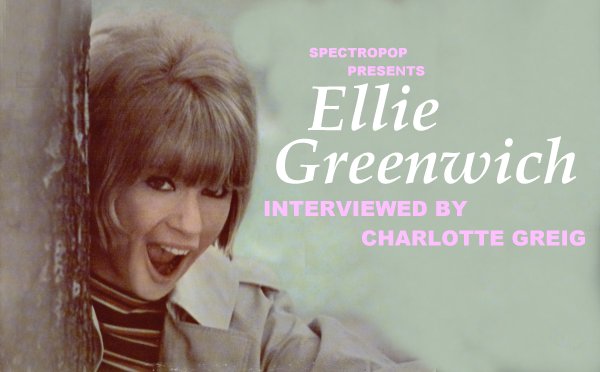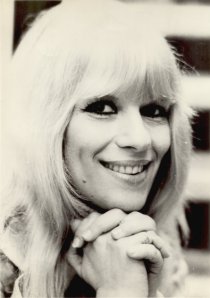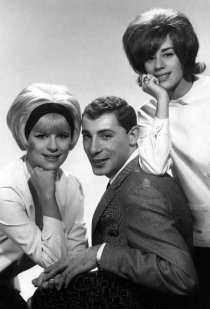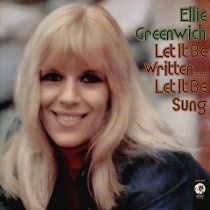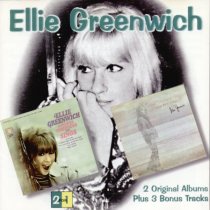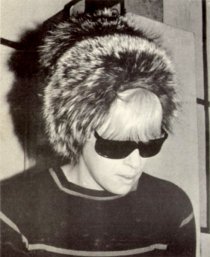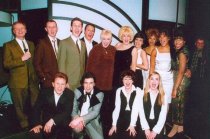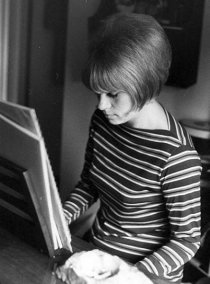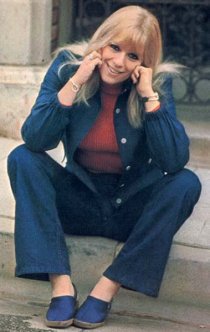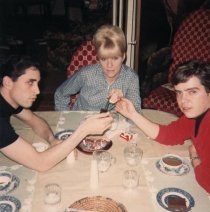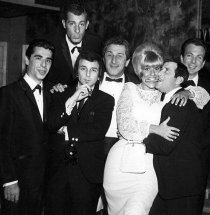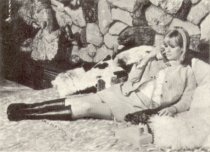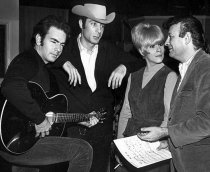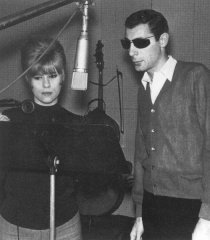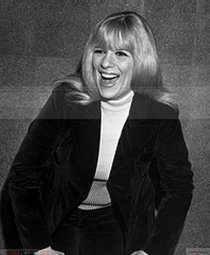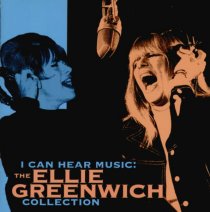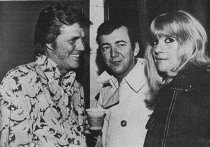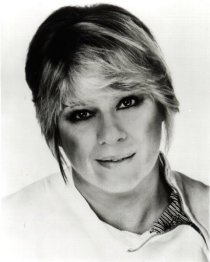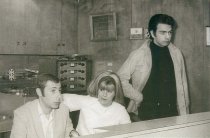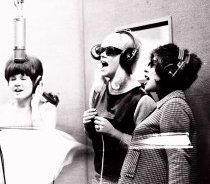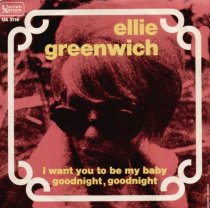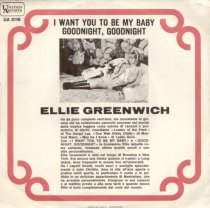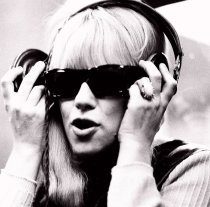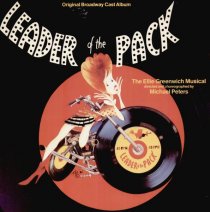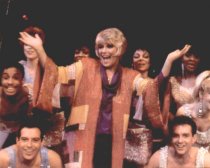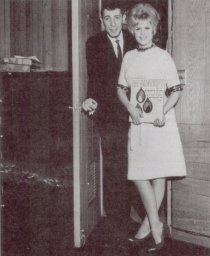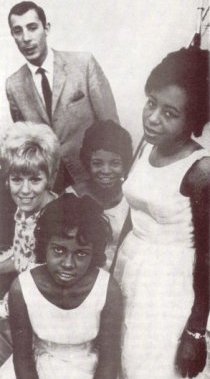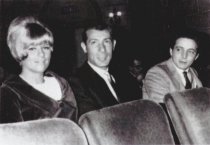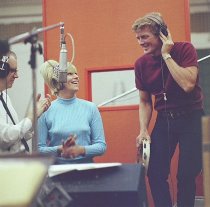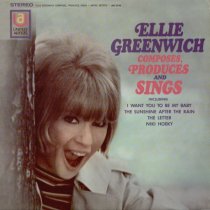|
CHARLOTTE:
In the '60s, there were three husband and wife songwriting
partnerships that were really big, and you were one of them
with Jeff Barry. The others were …

ELLIE:
… Mann & Weil and Goffin & King.

CHARLOTTE:
What was it like working like that, with your husband?

ELLIE:
When things were working, and you're really connecting, what
could be better? Here's the person you're in love with, and
you're being creative together, and things are going well
- it's the highest high you can imagine. However, when there
were disagreements, it was very hard to leave it at the office
and go home at night and change hats: "Hi honey, what
do you want for dinner?" Jeff and I both got very involved
in studio work, and we were putting in the same hours. We'd
finally get home from a long day's work at the office - writing
the songs, rehearsing the groups, going in the studio - we'd
get home and you'd be hungry. You tell me, who's gonna cook
the meal? It wasn't like I was home all day, waiting for him:
"Here's your little dinner, dear." There became
some problems. It wasn't like, the man is the breadwinner,
and this is what you do. There was some rub there with Jeff
and I for a while, but we worked it out. It is hard to leave
things in the office when they don't go well.

CHARLOTTE:
You and Carole King both made solo albums. She did incredibly
well with hers …

ELLIE:
… I didn't wanna record. I absolutely did not want to
record. But with the advent of 'Tapestry' doing so well, labels
were calling me left, right and centre, saying, "Ellie,
you've got to record." I'm not stupid, and after a while
I thought, "I have to take one of these offers."
But I wasn't up to it; I didn't have an image for myself.
I knew I didn't want to perform, and you had to, at that time.
The 'Let It Be Written, Let It Be Sung' album did so-so over
in England and in Europe, but not here. I did a tour - just
interviews, all over the country here, and I went over to
Europe, England, France - the whole thing. I went out on the
road to promote it, but I lip-synched because I was petrified
to do anything live.

Also, at that time, I opened up a jingle production company,
and was doing fairly well with jingles. That can be healthy
money, when you are writing jingles and singing on them. The
residuals can be kinda nice. I thought, "Let me get away
from records, and start a whole new thing." I did that
for a while, but towards the end of '72, into '73, I fell
apart. I guess you could say I had a nervous breakdown. I
left the business for a little over two years. When I came
back into the industry, I thought, "Let me get back into
background singing, I'm so happy on microphone. I could pretend
I was in a girl group, get a couple of other girls, have a
good time. I inched my way back into the things I wanted to
do. Then I started writing again. I had some records with
Ellen Foley, then got involved with Cyndi Lauper. Slowly,
I found my way in.

CHARLOTTE:
You were also involved with Blondie, weren't you?
I just talked to Alan Betrock about 'Out In The Streets',
one of their first demos.

ELLIE:
Yes. As a matter of fact, I had gotten tapes in from Alan
on this new group he had, Blondie. Really, those demos weren't
done particularly … well. I hate to say it on microphone,
but this is the truth. Debbie did have a look, but I opted,
unfortunately for me, not to get involved. Surely, there they
were several months later, becoming the biggest thing since
sliced bread. I sang on their first album, a lot of background
stuff, and on some songs on the 'Eat To The Beat' album. We're
sort of friendly-ish today, we keep in touch.

Cyndi Lauper's stuff has a '60s edge also, although she doesn't
wanna see it that way, because she doesn't wanna be dated,
so to speak. 'Girls Just Wanna Have Fun' could have been 1960s,
if you took those synthesizers out. Cyndi Lauper is a great
singer. She can really handle mostly any kind of material.
I had a song that was the B-side of 'Girls Just Wanna Have
Fun', a thing called 'Right Track, Wrong Train'. And I sang
background on her first album, and her most recent album.

CHARLOTTE:
You also wrote some songs for Nona Hendryx.

ELLIE:
In the early '80s, I started writing with a guy named Jeff
Kent, who was with a group called Dreams and a group called
Pierced Arrow. We wrote some things that were a little more
guitar oriented, a little heavier. I'm very close friends
with Nona and her manager, Vicki Wickham. Nona was getting
ready to record and asked me if I had any stuff. She came
over. Jeff Kent and I had written this song called 'Keep It
Confidential', which really had more of a country slant to
it, than R&B. It was an attitude kind of a song. Nona
loved it. We wrote the song with Ellen Foley, who used to
be with Meatloaf. It was supposed to go on her album, but
Nona took it, rearranged the whole thing, and it came out
as a single. That did so-so. Then we got together, and she,
Jeff and myself wrote a couple more things that went on her
last couple of albums. Then 'Leader Of The Pack' happened
in '83.

CHARLOTTE:
How did that show come about

ELLIE:
Some friends of mine own the club The Bottom Line in New York
City. I'd always go there to see different shows. I had taken
a break from writing for a while in the '70s. I started to
write again, and a lot of the acts that were recording my
songs - such as Nona Hendryx, Karla DeVito and Ellen Foley
- were doing shows at The Bottom Line, so I would go see the
shows. For years, the owner, Alan Pepper, would say, "Why
don't you do a show here?" I'd say, "No, no, I don't
perform." Also, I was really petrified. It wasn't that
I wasn't interested. Late in '83, I'd gone down there to see
a show, and Alan took me aside. He goes, "I'm really
serious, I wanna do a show with all your music. I'd love you
to be in it, but if you don't wanna be in it, just talk about
it. We'll see what we can pull together." I figured,
what the heck? So we got together and we did this little show.
A friend of mine came in and wrote a little script, just to
get from one song to the other, a little story about me and
my music. They sort of convinced me to be in it. So I took
a deep breath - for two or three nights that wouldn't be so
bad. This was in January of '84. We had two shows a night.
The response was phenomenal. Some people from Broadway came
down and thought it might be a great idea to take to Broadway.
We re-ran the show for a month, April 27th through May 27th
of the same year, down at The Bottom Line, to wonderful reviews.
We were sold out all the time. It was terrific.

Then we moved on to Broadway, which, unfortunately, became
very problematic. The show ran for five months, but there
were a lot of internal problems with the producers - the usual
business stuff that goes on. There was really no vision for
the show. It's kind of a hybrid. It's rock'n'roll, and Broadway
doesn't really readily accept rock'n'roll. It worked better
in a smaller club. It might have worked well on Broadway if
they'd have stuck to a musical revue format, with a few anecdotes
about the time and myself. They didn't quite get a book musical
out of it, and it wasn't really quite a rock'n'roll revue.
The vision was lost. The book people didn't know how to respond,
nor did the rock people. Had there been more of a vision,
and some money put into advertising, we could have run. Because
the audiences loved it. They love the music; it's a proven
thing.

CHARLOTTE:
You've got a good voice, and you're not a shy person, so why
did it take you song long to want to get out there and perform
on stage?

ELLIE:
Well, I'm not shy, but I am. I don't consider myself as having
a good voice. I have what they call a "sound". I
did want to perform in the '60s, but I was married at the
time, to Jeff Barry, with whom I wrote a lot of hits. He didn't
feel that I should perform, because we were very busy writing
for all the groups that were recording our songs. We were
also producing records. He just felt that we were doing so
well writing and producing that to start a career as an artist
might have hurt that, which it probably would have. Being
married, and being from that time, I felt that this is what
my husband wanted, so I opted not to perform. I didn't mind
saying no. He was never emphatic, "You mustn't do it."
We talked about it, and I tended to go along. As the years
went on, the more I thought about doing it, the more I got
scared. The more you don't do that, the harder it is to even
consider it. So it left my mind.

So when this thing happened with 'Leader Of The Pack' at The
Bottom Line, I figured it was only six shows, I could bring
all my friends, you know, never expecting what happened to
happen. So I went from really doing nothing to The Bottom
Line to Broadway, which is kind of strange. In one respect,
the show was one of the most thrilling things that ever happened
to me, but it was also one of the worst, because of all the
BS that goes on.

CHARLOTTE:
In the '60s, when you were making all those records, there
was a big split between the songwriter and the artist, which
is something that's changed. How do you feel about that change?

ELLIE:
You mean that the artist would be the artist, and they would
take outside songs from independent songwriters, whereas today
the artists write their own thing? As a songwriter, it was
much easier in the '60s, when there was an artist who just
sang. There was a huge market and a need for the independent
songwriter. As a matter of fact, when the British Invasion
came here it greatly hurt. Here came all these self-contained
groups that wrote their own material and played their own
instruments, the whole thing. We wondered what we were going
to do with our music. We had to find our own artists to record
as vehicles for our material. It was great for those people
that wrote their own stuff and recorded it, but the independent
songwriter did suffer.

But it was at the time of the British Invasion that I discovered
Neil Diamond. A music publisher called me in to sing some
demos of some songs this guy had written. I'm there singing
these songs, doing these demos, and I said, "Who are
you?" He told me he was Neil Diamond, and that he'd had
a record out on Columbia. I thought his songs were kind of
interesting. I told him I'd like to hear more things. This
was in '65. I told him that I'd like my husband to hear some
of his songs. Jeff said we were kinda busy, that we wouldn't
have time, but we had him come in. Neil came in and played
us a bunch of songs. I loved the way he wrote and Jeff liked
his voice. So we went to a very dear friend of ours, Bert
Berns, may he rest in peace, who ran Bang Records at the time,
and we said, "We have this guy, do you want to hear some
things?" He heard a couple of songs and goes, "Here's
some bucks, go in and cut 'Cherry, Cherry' and 'Solitary Man'.
So we opened a company with Neil Diamond called Talleyrand
Music, and we co-published all his music with him. We salaried
him, weekly, and Jeff and I produced all his early hits. We
now had our own self-contained artist, who wrote his own material,
and sang it, and we were the producers.

CHARLOTTE:
Do you think overall in pop, it's been a good development
to have these singer-songwriters, or not?

ELLIE:
I think if you're good, it's great to be able to write your
own music and perform it. Because I don't think anyone's gonna
feel it the way you do. In that respect, creatively speaking,
if you're talented and can write some good stuff and perform
it, that's terrific. But for those that aren't that good,
I think it's a terrible thing.

CHARLOTTE:
What happened after Neil Diamond?
 
ELLIE:
Jeff and I were divorced right during that interim period.
That took me quite a long time to get over. It wasn't just
the marriage going, it was the career also - a double whammy.
Plus, divorce was not overly accepted. It was a major catastrophe.
So I had to deal with my family. At that time I got involved
with a guy named Mike Rashkow and we opened up a company called
Pineywood. But my head was nowhere. For close to six years,
I just didn't care what happened. I made a couple of records,
I did this, I did that. But my bubble was burst. My dream
was shattered, never to be really put back together again.
I had a very hard time.

CHARLOTTE:
These days, every person is expected to contribute more than
in those days, when you could be a great songwriter, but not
really have a great voice.

ELLIE:
Back in the '60s, there really were compartments. Everyone
had their own little spot. There was the record label. There
was the music publisher. There was the songwriter. There was
the record producer. There was the artist. They all had their
little jobs. Most of the time, those jobs did not overlap.
Nowadays, people publish their own music. The business has
grown so that people are much smarter on the business level.
There's a lot of money to be made in publishing, or producing
records. As technology has advanced, it's made it so much
easier to produce records. Once again, I think if the talent
is there, I see no problem whatsoever with everything crossing
over. It was a little easier in the '60s when everyone did
know their place, so to speak.

CHARLOTTE:
Of course, there were people like Phil Spector and, to some
extent, Carole King and yourself, who fulfilled all those
functions really.
 
ELLIE:
Spector, of course, wanted to do all those things by himself.
People like Carole and myself happened to come into an industry
as songwriters, but we also sang, didn't have bad voices,
and would make demonstration records of the songs we wrote.
Often those demos really came out great. The publisher would
hear it and think it could be a record. They would go to a
record label and the label would put it out. A case like that
was a group called the Raindrops, but there really wasn't
a group, it was just myself and Jeff doing all the voices.
We did this demo for a group called the Sensations, who'd
had a hit with 'Let Me In', (sings) "Let me in, wee-oo,
oop wee-oo". We wrote a song called 'What A Guy' that
we thought would be a great follow-up for them. We went in
and made the demo. The publishers heard it and thought it
could be a record. But there was no group. Back then, a lot
of labels put out what they called dummy groups. We'd throw
a few people together, go out and lip-synch the records, but
there really wasn't a group called the Raindrops. (In such
cases, the record company) would want to know who produced
the record? Well, Carole King produced it, she was in the
studio doing whatever, or Jeff and I were in the studio doing
it. We sort of came in the back door. We didn't think about
being producers, it just sort of happened to us. Whereas someone
like Phil Spector wanted to have his own label, wanted to
write, wanted to produce, wanted to control everything.

CHARLOTTE:
In those days you had arrangers. Now you have a songwriter
and a producer, and in the more kind of adult music you still
have arrangers. Do you have still have arrangers in ordinary
rock music?

ELLIE:
Back in the '60s we used arrangers, which we still do today.
Very often arrangers are used for their ideas, to some degree,
but very much to notate what's to be played. Sometimes a songwriter
hears an entire record in his head, but doesn't want to take
the time, and is probably not that well equipped, to write
down all these parts. So they'll hire an arranger, pay him
whatever, and have him arrange a session. With bands, they
jam all the time, and the arrangement happens. With a solo
artist who does not have a band, you have to have musicians
play something. Very often the producer, the songwriter and
the arranger will sit down and just brainstorm, but the arranger
will notate it.

CHARLOTTE:
When you went into the business, did you have the technical
skills, or were you just a new green person?

ELLIE:
I was a new green person, Charlotte. (Laughs) I played piano
well enough to write my songs. I do not consider myself a
good musician. I have very good musical instincts, but I would
never hire myself for a recording session. I was signed to
Leiber & Stoller - very big record producers and songwriters.
At one point they said, "We really ought to have a lead
sheet for this song." I sat there for hours counting
- one and two and - and I wrote these notes down. I learned
out of fear how to write my own lead sheets. I knew timings,
I knew what the notes were, I knew what to do, but I had never
really applied it. I think a lot of songwriters are kind of
lazy. If your main forte is songwriting, you don't really
wanna be bothered with the other stuff. So you hire an arranger.

CHARLOTTE:
Did you come from a musical family?

ELLIE:
My dad was a painter, and he sang a little bit and played
guitar, balalaika - he was of Russian descent - mandolin,
and all that stuff. He had some talent. My mom loved the arts.
She tried to sing, but not too well. So no, my family was
not overly musical.

CHARLOTTE:
What kind of family was it? Where did you live?

ELLIE:
I was born in Brooklyn. At the age of ten we moved to Levittown,
Long Island. We lived on the corner of Starlight and Springtime
Lane. My birthday is October 23rd, on the cusp of Libra and
Scorpio. My father was Catholic and my mother was Jewish.
I was destined for something - half and half, and on the cusp
of everything.

CHARLOTTE:
How did you find it as a woman in the music industry?

ELLIE:
When I first came into the industry, in the middle of 1962,
most of the women were background singers, or they were lyricists.
There were very few women who played piano, wrote songs, and
could go into a studio, work those controls and produce a
session. I wasn't your typical after-singer, as we called
them, who could go in and read that piece of music on the
stand, do 17 songs in three hours, boom-boom-boom. It was
a whole different thing. I'd go in, think of the background
parts, and put them down myself. I learned about overdubbing.
Back then they'd call me the Demo Queen. Many different publishers
would hire me to record demos of other writers' songs.

As a matter of fact, that's how I first met Dusty Springfield.
Every time somebody wrote a song for Dusty - they thought
of all the singers in New York at that particular time, I
sang closest to her - publishers would hire me for a nominal
fee to go into the studio; we'd run down the song, they'd
have a little band there, and I'd sing all these demos. Dusty,
when I first met her, said she had all these demos. She'd
wondered who the girl was singing on them, so they finally
told her. When she came here I was hired for one of her sessions
to sing background. So there we were stood on microphone,
looking alike - I tried desperately to sing exactly like her,
because she's one of my idols, vocally - and we've been friends
ever since, which is kinda nice.

CHARLOTTE:
In those days there was a hierarchy, where the artist is at
the bottom of the pile. Then you get the songwriter and the
producer. Would you agree with that?

ELLIE:
Fortunately, there was a grouping of us songwriters that was
able to make a career out of it. But there were people who
had one or two hits and then went into obscurity. They had
a rough time. But we were fortunate enough to be able to sustain.
I believe it was timing, luck, and our stuff was accepted.
Back in the '60s there were many small record labels - such
as Red Bird, Bang Records, and so on - that offered you the
opportunity to run up there and say, "Listen to this
song." There was a spontaneity that happened. The doors
were a little easier to walk through. A record label would
give you a shot to go out and produce a single. No more. The
single is no longer happening. It's always album, album. The
business has grown. It used to be called the MUSIC business.
Now it's the music BUSINESS. These days artists do publish,
do produce. The artist is real powerful nowadays. Back then
they weren't. If a songwriter had three or four things in
a row that made it, they had some power. The artist might
have been on the bottom rung in the '60s, but not today.

CHARLOTTE:
A lot of the girls, the artists, who I've spoken to say that
they were exploited. Would you agree with that?

ELLIE:
Yes, absolutely. I don't know what happened business-wise
with groups I was involved with, such as the Ronettes, the
Crystals and the Shangri-Las. I was not a record label, so
I don't know what kind of deals were made, what kind of money
they got. I wrote the songs, I rehearsed them on the songs,
I would sometimes co-produce a record with them, but as a
rule, I didn't know what their deal was. But very often they
were not paid the high royalties. In the late '50s and very
early '60s, those girl groups never got royalties at all,
which is terrible exploitation. Even male groups, like Frankie
Lymon & the Teenagers, didn't get the time of day. They'd
get $50 to come in and do the session - "See ya, kids."
It's terrible. They're still fighting things like that today.

CHARLOTTE:
As a songwriter, did you get the publishing dues that you
should have had?

ELLIE:
This is a tough question. People say that, "We can't
believe that you don't own any of your songs." That's
sort of what happened then. You mention the word publisher
… I thought, "Wow, it's gonna be in print, these
people are publishers, like a book publisher." I didn't
connect that you could actually publish your own stuff. Everybody
was much smarter than we were, coming in as kids. They knew,
"Ooh, there could be money here in publishing."
The Leiber & Stollers, the Don Kirshners, they all had
their own publishing companies. And we were very grateful
to be signed to them and get a weekly little paycheque. We
always got our royalties. We got our writer's money, but never
really knew to ask or question - which wasn't really their
fault - about retaining a piece. I mean, I wish I had a little
piece of every one of those songs I have written.

CHARLOTTE:
So none of those songs actually belong to you, but you get
royalties?

ELLIE:
I get royalties as a writer. People say, "God, you were
so ripped off!" I wouldn't say ripped off. I just wish
that there were people around me at the time that said, "Before
you sign this contract, why don't you consider A, B or C?"
It didn't even enter my mind. There's a funny story: in the
'Leader Of The Pack' show: I had gone to Leiber & Stoller's
office, and they thought I was Carole King. I was waiting
for an appointment, and I was playing away on the piano. They
went, "Carole!" I went, "No, no, no!"
I was a nervous wreck. They heard some stuff I had written
and, within a month or so, they had offered me a job, writing.
They offered me $75 a week. I thought that was a funny number,
and I said, "No, a hundred, you have to give me a hundred."
They finally agreed, and I thought, "Wow! A hundred bucks
a week! I'm really flying high here! I have the publishing,
I have a little cubbyhole to go to every day and write my
stuff. Who knows who I'm gonna meet?" I will say one
thing, in defence of not being involved in the business -
monetarily, a stupid, stupid move, but on a creative level,
you weren't bothered with any of those problems. All you did
was come in and hone in on your craft - go in and write your
songs. It was a happy time. To me, so I didn't get $200,000,
I got $25,000 - it was fine. You didn't really think in those
terms. In hindsight, years later, I went, "Oh my lord!"
But who knew that the songs that Goffin & King, or Mann
& Weil, or Jeff and I were writing would continue to live
on? We just thought, "It's a hit - great!" You worried
about your next hit, and you went on, never thinking about
10 or 20 years down the line. We didn't know.

CHARLOTTE:
At the time, the way people thought was completely different.
Your songs, particularly your songs, I notice, centre an awful
lot around marriage, romance, idealism and all that. Why were
you writing those kind of songs?

ELLIE:
Well … I guess I was writing the boy/girl relationship
songs because I'm really a hopeful romantic. And I think they
work. That's what we got out there: boys and girls. Everybody
loves to be in love. Everybody hates it when things are going
wrong. You meet someone you've flipped over; you really want
it to work out. Perhaps take it all the way and get married.
Also, what happened was, you start writing songs, and you
start having hits with that kind of theme, and you don't wanna
tamper with something that's successful. You gear yourself
to stay in that area. As a matter of fact, in the middle '60s,
I started writing some "message" songs. They said,
"Ellie, give us another 'Da Doo Ron Ron'. Give us a 'Be
My Baby'." They almost expected a certain type of song
to come out of me.

CHARLOTTE:
Those songs were so young, so much to do with teenage life.
I think that that music is under-estimated. People like it,
but they see it as simplistic. Yet they don't see other music,
like Elvis or whatever, as something old fashioned.

ELLIE:
It's hard for me to relate to my music, because I did it -
that was the music I grew up with, that was my job, that's
what I did. You watch audiences, these young kids going 'round
loving 'Da Doo Ron Ron'. It's new to them. Yet you see this
other group of people, aged between 35 and 50, the baby-boomers:
it takes them back to another time, an age of innocence. They
recall their first love, look at their husband and say, "That
was our song." There's something very nice about that.
These songs were part of their lives, which is heavy duty,
it really is.

CHARLOTTE:
Then the music changed as the teenagers grew up, and the real
problems of life came in on them. Do you think there was also
something about American society that was changing? Now, you
come to America, and you don't get the feeling of hope and
that great sense of a new society doing something wonderful.

ELLIE:
What's going on in society always affects culture, what's
going on in the arts. I think, with the loss of innocence,
the Kennedy assassination, Vietnam, and all that happening
her, people got very cynical and very bitter. And, of course,
a lot of the music reflected that. However, the music that
would talk about that was a constant reminder of what was
going on out there, but there was this other grouping of musical
stuff that allowed you to escape. It's rough out there. I
would hate to be a teenager growing up today - afraid of nuclear
war, afraid of this, afraid of that, afraid of pollution.
Progress is wonderful, but boy, it can ruin some nice things.

CHARLOTTE:
At a certain point, these male groups appeared from England,
a lot of whom were doing covers of girl group songs. What
happened then? Why was there a sudden shift from girls to
boys? Or was that just chance that the Beatles happened to
be a male group?

ELLIE:
When you get phenomenons that happen, such as an Elvis Presley,
or the Beatles, I think an industry is in need of a change.
They'll pull out every single stop to make that happen. People
say, "Wow, thank goodness for the girl groups. [Without
them] what would have happened to your songs? I say, "Well,
maybe it wouldn't have been as tender, and had exactly the
same meaning, but I could've seen a boy group doing (sings)
'and then she kissed me.'" It just so happened that I
got involved working with Phil Spector, who had Philles Records,
and he happened to have girls - Darlene Love, the Crystals,
the Ronettes. We never even thought in terms of girl groups,
we just wrote a song. I think some of it was chance that the
male groups came. The girls were out there, it was happening.
Then came the British Invasion, a new look, a new sound -
we were ready for it.

CHARLOTTE:
Who were the fans of girl groups? Were they boys, or girls,
or both?

ELLIE:
I think both. The guys thought, "Oh wow, would I love
to be with her!" Then there were the girls who wanted
to emulate them. Also, the girl group songs were very universal
subject matter, and relatively simple. A lot of kids could
sing along. The fans were definitely mixed.

CHARLOTTE:
Looking back on it, the Shangri-Las and the Ronettes stand
out as girl groups who had a strong image. The other girls
were more goody-goody. Were they bad girls?

ELLIE:
Overall, the girl groups had very sweet images, except for
the Ronettes and the Shangri-Las, who had a tougher, harder
attitude. By today's standards, they were as innocent as the
day is long. Back then, they seemed to have a street toughness,
but with a lot of vulnerability. Mary Weiss [had] the sweetest
long straight hair, an angelic face, and then this nasal voice
comes out, and this little attitude - the best of both worlds.
Were they tougher than [say] the Dixie Cups? They were a little
harder. They also knew they had a look, and they played into
it. But if you blew too hard on them … "Waaaah!"
You'd say, "This is what you're gonna do" The most
they'd ever say was, "Well, we're not gonna do it."
Ten minutes later, they were doing it. That's as bad as they
got, if you wanna consider that bad.

CHARLOTTE:
In the '70s and the '80s, there were a number of people who
went back to that girl group sound, but in a more tongue-in-cheek
way. Was it meant tongue-in-cheek to begin with? I know you
were sincere about what you were doing. I think people think
that they've discovered a humorous edge in what was meant
in a very sincere, perhaps rather naive way in the '60s. But
when you look at what the Shangri-Las did, you can't believe
that it was 100% serious.

ELLIE:
OK, 'Leader Of The Pack' … believe it or not, 'Leader
Of The Pack' was serious. (Laughs) Back in the '60s, when
you started making money, a lot of people went out bought
motorcycles. We figured, "Ooh, we'll take a trend that's
happening, make a boy/girl love song, but let's give it a
sick element, let's have the guy die." It was like a
little soap opera. We wrote that song with a guy named Shadow
Morton. He wrote 'Remember (Walkin' In The Sand)', songs like
that. Now, they look at songs like that with a satirical edge,
but when we wrote it, we were serious about it.

CHARLOTTE:
A lot of feminists would feel that the songs you wrote - because
they were saying how wonderful marriage was, how great it
would be the day you got married and had babies - were oppressive
to women.

ELLIE:
I know people that have gotten married in the past two years
who have used 'Chapel Of Love' as their wedding song. I think,
no matter how much of a feminist one claims to be … Lord
knows, if you go by my songs, and the way my personal life
has gone, you'd say, "Oh my, this lady was dreaming."
It didn't exactly happen the way I was writing it. However,
I would have liked it to have gone that way. I am a very firm
believer in equality, women and men: if you can do the job,
by all means go ahead and do it. But I still feel it would
be nice if that romance can be there, birds could sing if
you fell in love, and you could hear violins. I think that
would be really terrific - I don't care how old you are, or
what generation.

Most of my famous songs were early to mid-'60s. Attitudes
starting changing in the late '60s, into the '70s. A lot of
people that I got involved with in the music industry - '70s
people, the next generation - would ask me, "What was
it like in the '60s? Were you really like your songs?"
I'd tell them that I came in right out of college, grew up
in a nice middle class family out in Long Island, got my degree
as a teacher, taught for three and a half weeks, and thought,
"Naah, I gotta try music. I'll always have this to fall
back on." I wanted a little house with a picket fence,
2.3 children. I really wanted that. That's what I had hoped
was gonna happen for me. To hear my stuff on the radio: "Ooh,
ooh, ooh, this is bliss, ultimate bliss." I really came
into the industry with the belief that if you work hard enough,
I could have a taste of that. But then, when my marriage did
fall apart … well, the disillusionment, you can imagine:
the person who wrote 'Doo Wah Diddy' and 'Chapel Of Love'
has gotta be devastated. I realised, those words, "'Till
death do us part", they don't really mean anything. Through
the good times and bad times - what happened to that? We're
having bad times - why should this be over? I think if Jeff
and I hadn't been so successful so quickly, and had taken
the time to grow together as people, and gotten to know each
other a little better … I knew him very well for the
year and a half we were dating, but then we got so busy in
the throes of the industry - writing, contracts, studios and
this and that - that the minute a personal problem came up,
we put it on the back burner. We didn't have time to work
out those things.

CHARLOTTE:
'River Deep - Mountain High' sounds like a more adult kind
of song. I read that you were breaking up with Jeff at that
time.

ELLIE:
We were already divorced. When we got divorced, because we
were such a successful writing team, we thought that for business
purposes, if people find out, fine, but let's not overly publicise
it. We got divorced right around Christmastime, December 13th,
but we'd already had all these cards printed, "From Ellie
& Jeff Barry." We just signed them, "Ellie &
Jeff", and sent them out. People found out as time went
on, but we were still working together, although we took time
off to clear the head. Phil had called Jeff about the three
of us getting together to write again, which we hadn't done
in a couple of years. We met at Jeff's apartment, and we had
to fill Phil in, "By the way, we're no longer together."
He was concerned if we could still write together. We said,
"No problem, we can certainly do it." Phil told
us it was for Tina Turner, and it would be a big departure
from what she had been known for. We sat down, I think over
a period of two days - now, we were all working individually,
Phil had started something, Jeff had started something, I
had started something - sat down at the piano and played the
things we had started. We pulled from all those things, and
out came 'River Deep - Mountain High'. It was like a little
potpourri of all the things we had been writing.

At that same writing session we also wrote 'I Can Hear Music',
which is kinda interesting: "This is the way I always
thought it would be." My, my, my, what's going on here?
I think the fact that I had now gone through a divorce - so
had Jeff, and Lord only knows what Phil Spector had been through,
and still goes through - gave a little edge to our writing.
Yet that hopefulness was still in there: "When I'm with
you, I can hear music, everything else disappears."

CHARLOTTE:
Are you still in touch with people like Jeff Barry, Phil Spector,
Leiber & Stoller?

ELLIE:
Leiber & Stoller I speak to occasionally, and see at certain
music business functions.

CHARLOTTE:
I read that they never really liked girl group music. They
thought it was … silly.

ELLIE:
Well, it wasn't the kind of stuff that they wrote, but I don't
think things like 'Yakety Yak' and 'Charlie Brown' were exactly
… hey! But they didn't have to get involved in that side
of things. They had signed writers, Jeff and myself, who took
very good care of that end of what was happening in the business.
They did very well financially from our songs.

CHARLOTTE:
What's going on with your career at the moment?

ELLIE:
My career's had some ups and downs, like everybody's has.
At the present time I'm starting to write again, which I haven't
done in quite a while. I've also opened up a jingle production
company - great name, it's called Hook, Line & Singer.
A guy named Steve Tudanger [1] and myself, we write and produce
commercials for radio and TV. Also, my manager Bob Weiner
and I have just recently acquired the stage rights for the
'Leader Of The Pack' show and we hope to get a tour out there
[2].

|
